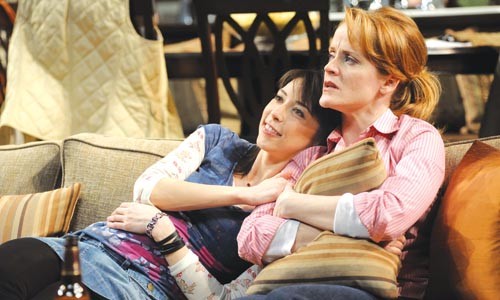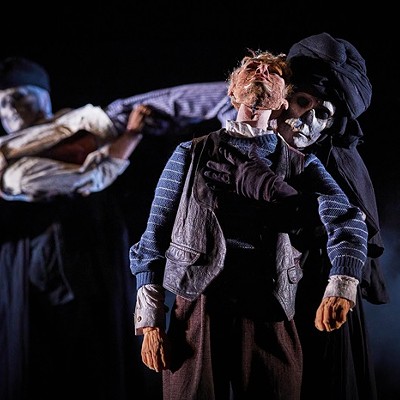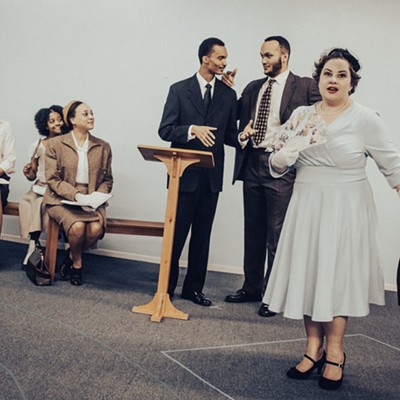I know, I know ... it's silly to think an award ever means anything. The fact that a movie wins an Oscar doesn't make it a good movie -- it just makes it an Oscar-winning movie. I once wanted to believe that at least the Pulitzer Prize signified a certain level of quality. But I've come to see that each time the Pulitzer people get it right -- Our Town, Death of a Salesman and Proof, for instance -- they get it wrong somewhere else. Either they skip work like Glass Menagerie and The Crucible, or they bestow awards on such nonsense as Harvey, J.B. and, God help us, Dinner With Friends.
Case in point: The Pittsburgh Public Theater's presentation of last year's Pulitzer-winner, David Lindsay-Abaire's Rabbit Hole. Since there's not much in the way of drama happening onstage, you can pass the time trying to figure out what the hell the Pulitzer people were thinking.
You won't be alone. I'm trying to work it out, and so is a chunk of the New York theater-going community. The Broadway production, which starred Cynthia Nixon and Tyne Daly, lasted for only 77 performances; the show had already closed by the time the award was announced. So what's going on?
Eight months before the curtain rises on the action of Rabbit Hole, 4-year-old Danny chased his dog into the street, got hit by a car and died. So now we meet Howie and Becca, Danny's parents. Their grief, not surprisingly, is monumental. It seems as if they'll never move beyond it.
Slow curtain. The end.
Really, that's it. They're devastated, we see several scenes where their devastation is manifested, and then the show's over.
Any accepted definition of what makes a play would automatically exclude Rabbit Hole. The writing isn't bad, certainly, and the characters are interesting enough ... but plot? Dramatic movement? Conflict? Try someplace else. All Rabbit Hole does is show us people grieving in pretty much the way we'd expect them to grieve. Lindsay-Abaire is a good enough writer to avoid soap-opera clichés, but the play offers no new insights, or indeed any insights at all. It's just two hours spent watching people grieve.
Was that Lindsay-Abaire's intention? It's his play, so he can do whatever he wants. But what we feel for Howie and Becca at the end (sorrow) is exactly what we feel for them at the beginning. So what the point of the intervening two hours is, I couldn't tell you.
Lindsay-Abaire goes to extraordinary dramaturgical lengths to make sure we understand that everyone in the story is a genuinely nice, loving person (to whom unbearable sorrow has come). So unfortunately, there's not an ounce of tension. Every 20 lines or so, somebody says something a bit barbed ... but we're then immediately reminded that it's just the grief talking.
Two hours is a very long time to watch nothing happen. But at the Pittsburgh Public Theater, at least nothing is happening on Luke Hegel-Cantarella's stunning kitchen/dining-room/living-room set. I could have lived without the thuddingly obvious addition of Danny's empty bedroom hovering over the action, but if you're going to grieve, Hegel-Cantarella has provided a gorgeous place to do it.
Rob Ruggiero directs a uniformly polished cast -- Dylan Chalfy, Joey Parsons, Erika Rolfsrud, Alec Silberblatt and Jo Twiss -- for whom the obvious watchwords are intelligence and dramatic dignity.
In fact, if you ask me, all of them have more theatrical sense than those Pulitzer people.
Rabbit Hole continues through May 18. Pittsburgh Public Theater, 621 Penn Ave., Downtown. 412-316-1600 or www.ppt.org















